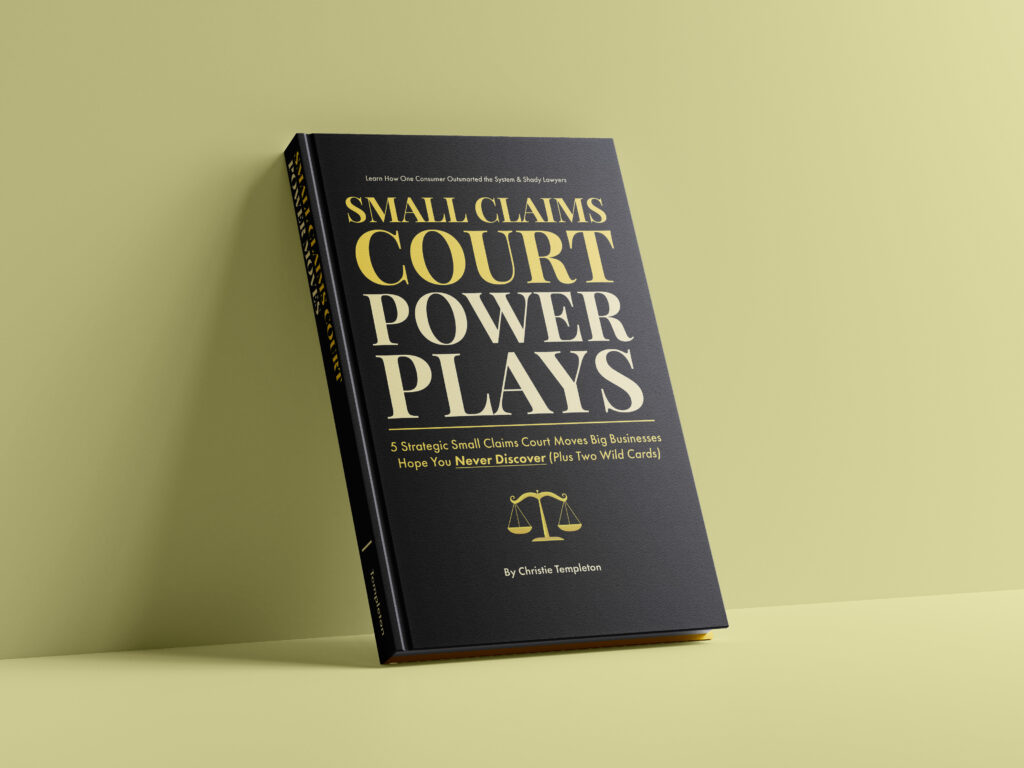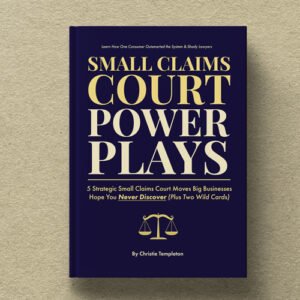Introduction
That shady dealership thought you’d just give up. Let’s prove them wrong.
If you’ve been lied to, ripped off, or stonewalled by a car dealership, you’re not alone. These businesses bank on the assumption that you won’t fight back. But small claims court gives consumers like you the power to strike back fast, without needing a lawyer or spending a fortune.
In this guide, you’ll learn exactly how to sue a car dealership in small claims court and win. From identifying the right legal claim to organizing your case, we break it all down step-by-step.
Want to take it even further? My eBook Small Claims Court Power Plays is packed with copy-and-paste legal language, subpoena templates, and real consumer strategies that win. [Grab the full playbook here.]
What Is Small Claims Court?
Small claims court is a simplified legal system created so everyday people can take legal action without needing a lawyer. It gives you the power to fight back when someone owes you money, broke a contract, lied, or caused you financial harm. You don’t need legal training. You don’t need thousands of dollars. You just need to know how the process works and how to prepare.
How It Differs from District or Civil Court
In district or civil court, you usually deal with lawyers, complex motions, and long wait times. Small claims court strips all of that away. It’s designed to be informal, fast, and inexpensive. Most states schedule hearings within a few weeks or months. Some even prohibit lawyers from representing either side, which means you’re not at a disadvantage if the business you’re suing has legal resources. Instead of spending a year fighting over paperwork, you show up with your evidence, explain your case to the judge, and get a ruling that day or shortly after. Filing fees are low and the rules are simple.
What Kinds of Cases You Can Bring
Small claims court handles things like breach of contract, fraud, misrepresentation, property damage, and failure to perform services. If a car dealership sold you a lemon, lied about vehicle history, refused to return your deposit, or didn’t deliver on their promises, these are exactly the kinds of claims small claims court was built to handle. It also works for situations involving unpaid wages, bad repair jobs, or landlords refusing to return your security deposit.
What You Can’t Sue for
There are limits. You cannot sue for emotional distress or pain and suffering. You cannot sue for defamation or libel. You also cannot bring a case that exceeds the financial limit for your state. That cap varies but is usually somewhere between two thousand five hundred and twenty five thousand dollars. If your case is too complex or involves expert testimony, the judge may refer you to a higher court.
If you’re unsure whether your case qualifies or what your state’s exact limits are, my book covers all of it in plain English. It walks you through how to file, what to say, and what to expect. It also includes tips for avoiding common traps and mistakes people make the first time they try to sue. When you walk into that courtroom, you’ll know exactly what you’re doing, and why the dealership should be worried.
Top Reasons People Sue Car Dealerships
Bait and Switch Tactics
Car dealerships often lure buyers in with promises they never intend to keep. They might advertise a specific price, a special offer, or a fully loaded version of a car, but once you arrive and start the paperwork, everything changes. One common tactic is to claim the original deal has “fallen through,” then present you with a more expensive offer. Sometimes they’ll show you a vehicle with high-end features, then switch it out for a base model at signing. Other times they add surprise fees, claiming they were standard or required, even though they were never mentioned before. This isn’t a miscommunication, it’s a tactic, and you can absolutely take them to court for it.
Refusing to Return a Deposit
Another common scam involves deposits. You might put down money to hold a car, start the paperwork, or initiate financing, only to later decide not to move forward with the deal. In many of these cases, the dealership will flat-out refuse to return your deposit, even if they have no legal right to keep it. Maybe your financing wasn’t approved, maybe you backed out within the cancellation window, or maybe the dealership failed to deliver the vehicle as promised. No matter the excuse, if they’re holding your money hostage, small claims court gives you a way to get it back.
In Small Claims Court Power Plays, I show you exactly how to subpoena dealership phone records, email logs, and text messages so you can prove what really happened, even if they try to lie in court.
“As-Is” Disclaimers and What They Really Mean
Dealerships love to throw around the phrase “as-is” as if it’s a magic shield against lawsuits. They’ll tell you that since you signed something saying the car was sold as-is, you can’t come after them for anything that goes wrong. That is false. As-is only protects the dealership if they didn’t lie, conceal information, or commit fraud. If they misrepresented the condition of the vehicle, failed to disclose serious issues, or manipulated documents to hide damage or title problems, that disclaimer does not hold up in court. Fraud always overrides as-is.
Odometer Rollbacks and Title Problems
Title fraud and odometer tampering are illegal but still happen more often than they should. A dealership might sell you a rebuilt or salvage vehicle without disclosing that information, hoping you won’t notice until it’s too late. They may even roll back the odometer or manipulate service records to make the car appear newer than it really is. Some fail to transfer proper title in a timely manner, which can delay registration or affect your ability to resell the vehicle. If any of these things happened to you, small claims court is absolutely the right venue to get justice.
Failing to Honor Warranties or Service Agreements
Plenty of dealerships push extended warranties or service contracts that sound great on paper but mean nothing when it’s time to use them. They might sell you a bumper-to-bumper warranty, then deny coverage when something breaks. They might tell you during the sale that service is included, only to backpedal later and claim you misunderstood. Some even hand out fake warranty documents or sign you up with shady third-party companies that vanish when you try to file a claim. If you paid for coverage and didn’t receive it, that’s breach of contract, and you can sue.
Step-by-Step: How to Sue a Dealership
If you’re ready to take action against a dishonest car dealership, this is the process you’ll need to follow. It’s simpler than you think, but every step matters. Small claims court is designed for people like you to stand up and win, as long as you come prepared.
Step One: Gather Your Evidence
Before anything else, you need to build your case. That means collecting every scrap of proof that supports your side of the story. Start with the signed contracts and purchase agreements. Include any text messages, emails, or notes from conversations you had with the dealership. Save all advertisements, website listings, and screenshots that show what they promised or misrepresented. Take photos of the car, the odometer, any damage, and the VIN number. If you had a mechanic look at the vehicle, include their inspection report or diagnostic summary. The stronger your paper trail, the harder it is for them to deny the facts.
In my book, I include a full sample evidence checklist along with templates you can use to subpoena phone records, warranty paperwork, and other documents if the dealership refuses to cooperate.
Step Two: Send a Demand Letter
You cannot file a lawsuit without first giving the dealership a chance to fix the problem. That’s where the demand letter comes in. Your letter should clearly explain the issue, state the amount you are demanding, and give them a reasonable deadline to respond. Ten business days is typical. Be polite but firm. This is not the time for threats or rants. Just present the facts and make it clear that if they don’t respond, you will be filing in small claims court.
You must send the demand letter by certified mail with a return receipt requested. That gives you proof they received it, which the court will want to see.
Step Three: File Your Claim
Once the deadline passes and they’ve either ignored you or refused to make it right, it’s time to file your lawsuit. You will need to file in the correct county, usually where the transaction took place or where the dealership is located. Make sure you file against the correct legal business name. This is critical. Most dealerships operate under a company name that’s different from their public-facing brand. You can find their registered business name by searching your state’s business entity database online.
You’ll pay a filing fee, which is typically low, and you’ll need to arrange for the dealership to be served with the lawsuit. That can be done by the sheriff, a private process server, or certified mail, depending on your state’s rules.
Step Four: Prepare for Court
Once your case is filed and served, your job is to prepare. Organize all your evidence into a folder or binder. Print everything. Do not assume your phone will work or that the judge will accept screenshots without context. Write out a clear, short explanation of what happened and practice telling your story out loud. Anticipate the dealership’s defense and think through how you’ll respond. Be ready to answer the judge’s questions calmly and directly. The more confident and prepared you are, the more seriously the court will take your claim.
Step Five: The Hearing
On the day of your hearing, show up early and dress respectfully. You don’t need to wear a suit, but look professional. When it’s your turn, speak clearly, stick to the timeline, and let your evidence do the heavy lifting. Do not interrupt the judge or the defendant, even if they lie. Stay calm and focused. Only respond to what the judge asks. The goal is to be seen as reasonable, credible, and prepared. Many people win just by showing up with a solid case and keeping their cool.
Step Six: After You Win or Lose
If you win, you’ll receive a judgment stating how much the dealership owes you. But the court does not automatically enforce payment. You may need to take additional steps, such as filing a bank levy, placing a lien on business property, or initiating wage garnishment. If the dealership still refuses to pay, you can also file post-judgment motions to compel payment or seize assets.
If you lose, do not panic. Ask the judge immediately whether you have the right to appeal and how long you have to file it. Sometimes appeals are allowed, especially if you believe the court misunderstood part of your evidence or if the dealership made false claims that swayed the decision.
What to Watch Out For
Just because small claims court is supposed to be lawyer-free doesn’t mean the dealership will play fair.
In many states, businesses can’t bring a lawyer into the courtroom, but they can be trained, coached, and prepped behind the scenes. That means the person you face in court may have already rehearsed what to say, what not to admit, and what tricks might make you panic or second-guess yourself.
Here’s what shady dealerships (and their behind-the-scenes lawyers) might try:
- Claim they never received your demand letter, even if you have proof
- Show up with a “manager” who suddenly knows all the right legal terms
- Try to confuse the court by misnaming you or denying the transaction ever occurred
- Drop intimidating paperwork on you at the last minute, hoping you’ll fold
- Pretend they’re going to file a counterclaim, even if it’s nonsense
These aren’t rare tactics, they’re playbook moves. And if you’ve never been to small claims court, they might work on you.
That’s why my book exists. Small Claims Court Power Plays doesn’t just teach you how to file, it teaches you how to counteract legal bullying, outmaneuver stall tactics, and win when the dealership thinks you’re just some amateur. Don’t let them ambush you. Get the strategies that put you back in control.
Final Thoughts: Don’t Let Them Win by Default
Car dealerships are used to consumers giving up. They expect that you won’t push back.
But you can.
You don’t need a lawyer. You don’t need thousands of dollars. You just need your voice, your proof, and a little help from someone who’s already fought this battle.
Ready to win? Download Small Claims Court Power Plays and get all the legal tricks, scripts, and templates you need to beat shady businesses in court.




